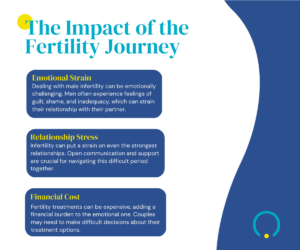Topic Quick Links

The path to parenthood is a deeply personal and often challenging journey for many couples. While infertility is a struggle that both partners can face, male infertility is a topic that is sometimes overlooked or misunderstood. It is often assumed that the problem lies with the female partner, however in nearly 30% of infertility cases, male infertility is the cause. In this article, we will address the role of male infertility in the IVF process, including the use of sperm donors and other male fertility treatments.
Understanding Male Infertility
Male infertility refers to a condition in which a man experiences difficulties in impregnating a fertile female partner due to issues related to his reproductive system or sperm quality. Infertility is generally defined as the inability to achieve pregnancy after one year of regular, unprotected sexual intercourse. Male infertility can result from various factors, including:
- Low Sperm Count (Oligospermia): This is when a man’s semen contains fewer sperm than the normal range (typically below 15 million sperm per milliliter). A low sperm count can reduce the chances of sperm successfully fertilizing an egg.
- Abnormal Sperm Function: Even if a man has a sufficient sperm count, the sperm may have mobility issues (asthenospermia) or abnormal morphology (teratospermia), meaning they may not swim effectively or have a proper shape to penetrate and fertilize an egg. Sperm count and function can be evaluated with a semen analysis.
- Blockages or Structural Problems: Physical obstructions, such as blockages in the male reproductive tract or structural abnormalities in the testes or ducts, can prevent sperm from being ejaculated.
- Hormonal Imbalances: Hormonal imbalances, such as low testosterone or high levels of prolactin, can disrupt sperm production and function.
- Genetic Factors: In some cases, genetic factors can contribute to male infertility, leading to issues with sperm production or function.
The Impact on the Fertility Journey

Emotional Strain: Dealing with male infertility can be emotionally challenging. Men often experience feelings of guilt, shame, and inadequacy, which can strain their relationship with their partner.
Relationship Stress: Infertility can put a strain on even the strongest relationships. Open communication and support are crucial for navigating this difficult period together.
Financial Costs: Fertility treatments can be expensive, adding a financial burden to the emotional one. Couples may need to make difficult decisions about their treatment options.
Seeking Help and Treatment
Male infertility is a complex issue, and its diagnosis and treatment often require medical evaluation by a urologist or fertility specialist. Fortunately, many cases of male infertility can be treated or managed. Making healthy lifestyle choices such as maintaining a balanced diet, managing stress, and avoiding tobacco and excessive alcohol can improve sperm quality. In some cases, medications can address hormonal imbalances or other underlying issues, and surgical procedures can correct physical blockages or structural problems. Ultimately, Assisted Reproductive Technologies (ART treatments) like intrauterine insemination (IUI) or in vitro fertilization (IVF) can help couples achieve pregnancy when male infertility is a factor.
The Gift of Sperm Donation
Donor sperm insemination is a relatively low cost alternative treatment for couples with male infertility who do not wish to consider In Vitro Fertilization (IVF), or in cases where despite all efforts, no sperm could be retrieved from the male partner for IVF treatment. Sperm donation is a carefully regulated and ethical process. Donors typically remain anonymous, and both parties—the donors and the recipients—have legal rights and protections.
The process generally involves:
- Donor Screening: Donors undergo extensive medical and psychological evaluations, as well as genetic testing, to ensure they are suitable candidates.
- Sperm Collection: Donors provide sperm samples through a controlled and monitored process.
- Storage and Testing: Sperm samples are carefully stored and undergo additional testing to confirm their quality and safety.
- Matching and Fertility Treatments: Sperm from donors is matched with recipients based on specific criteria, and it can be used in various assisted reproductive techniques, including IVF or IUI.
Male infertility is a challenging issue that affects many couples on their fertility journey. It’s essential to recognize that infertility is not solely a female concern and to seek professional help and support when facing this issue. There are various treatments available to address male infertility, including the use of sperm donors and other ART options. By working closely with a fertility specialist, couples can increase their chances of success in conceiving a child through IVF.
To determine if male infertility is impacting your fertility journey, request an appointment with Boca Fertility by phone or request an appointment online today.




